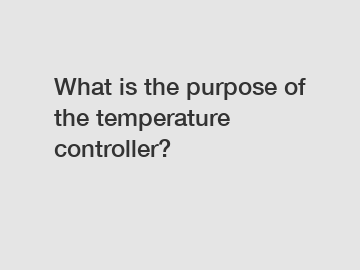What is the purpose of the temperature controller?
Apr. 04, 2024
Link to Nuclear & Electronics
Temperature Controller: An Essential Component in HVAC Systems.
Temperature controllers are a crucial component in heating, ventilation, and air conditioning (HVAC) systems. They play a vital role in maintaining a comfortable and consistent indoor environment by regulating the temperature of a space. In this article, we will explore the purpose of a temperature controller in HVAC systems and how it contributes to overall system efficiency.

**What is a Temperature Controller?**.
A temperature controller is a device that is used to monitor and control the temperature of a space. It is typically installed in HVAC systems to regulate the amount of heating or cooling required to maintain a set temperature. Temperature controllers can be found in various types of HVAC equipment, including furnaces, air conditioners, heat pumps, and thermostats.
**How Does a Temperature Controller Work?**.
Temperature controllers work by continuously monitoring the temperature of a space and comparing it to a pre-set desired temperature. When the actual temperature deviates from the setpoint, the temperature controller sends a signal to the HVAC system to adjust the heating or cooling output accordingly. This feedback loop ensures that the temperature is maintained within a specified range, providing optimal comfort for occupants.
**Benefits of Using a Temperature Controller**.
One of the primary benefits of using a temperature controller in an HVAC system is energy efficiency. By accurately monitoring and controlling the temperature of a space, a temperature controller can help reduce energy consumption and lower utility costs. In addition, temperature controllers can help prevent temperature fluctuations and maintain a consistent indoor environment, increasing occupant comfort and productivity.
Another benefit of using a temperature controller is system protection. By preventing overheating or overcooling, a temperature controller can help extend the lifespan of HVAC equipment and reduce the risk of system malfunctions. Additionally, a temperature controller can provide diagnostic information about the performance of the HVAC system, helping technicians identify and resolve issues quickly.
**Types of Temperature Controllers**.
There are several types of temperature controllers available, ranging from simple thermostats to complex programmable controllers. Thermostats are the most basic type of temperature controller and are commonly used in residential and commercial HVAC systems to regulate temperature based on user input. Programmable controllers, on the other hand, offer advanced features such as scheduling, remote access, and data logging, making them ideal for complex HVAC applications.
**Conclusion**.
In conclusion, the purpose of a temperature controller in an HVAC system is to monitor and control the temperature of a space, ensuring optimal comfort, energy efficiency, and system protection. By accurately regulating the heating and cooling output of HVAC equipment, temperature controllers play a critical role in maintaining a consistent indoor environment and extending the lifespan of the system. Whether you are looking to upgrade your existing HVAC system or install a new one, a temperature controller is an essential component that should not be overlooked.
If you have any questions or need assistance with selecting the right temperature controller for your HVAC system, please feel free to contact us. Our team of experts is here to help you find the best solution for your specific needs.
Contact us for more information on temperature controllers and how they can benefit your HVAC system.
For more information, please visit our website.
Are you interested in learning more about I-131 radiotherapy? Contact us today to secure an expert consultation!
151
0
0

Comments
All Comments (0)